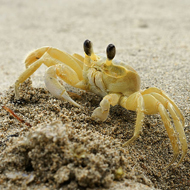
Study says move is the cheap option to save shoreline habitat
Ecological engineering to create artificial rock polls in seawalls could boost the numbers of crabs, limpets and starfish, a study has found.
A study by the Centre for Research on Ecological Impacts of Coastal Cities at the University of Sydney, Australia, said that 80 per cent of the money spent on protecting coastlines from climate change, is spent on new seawalls or strengthening, lengthening or increasing the height of existing ones.
"Although this protects important infrastructure, it has serious consequences for intertidal biodiversity," said lead author Dr Mark Browne who conducted the study with Prof Gee Chapman.
They added concrete pots at mid and high shore tidal levels to sandstone seawalls at Sydney Harbour and found that the artificial rock pools not only increased the number of creatures living around the area, but also supported greater covers and densities of algae.
"These results show an easy cost effective method that authorities can use to try to mitigate the adverse effects of intertidal assemblages of armouring shorelines with featureless, vertical walls," said Dr Browne.
Their findings have been published in full in The Marine Ecology Progress Series
Image by Hans Hillewaert



 The Greyhound Board of Great Britain has published new vaccination guidance, with all greyhounds registered from 1 January, 2027 required to have the L4 leptospirosis vaccination, rather than L2.
The Greyhound Board of Great Britain has published new vaccination guidance, with all greyhounds registered from 1 January, 2027 required to have the L4 leptospirosis vaccination, rather than L2.